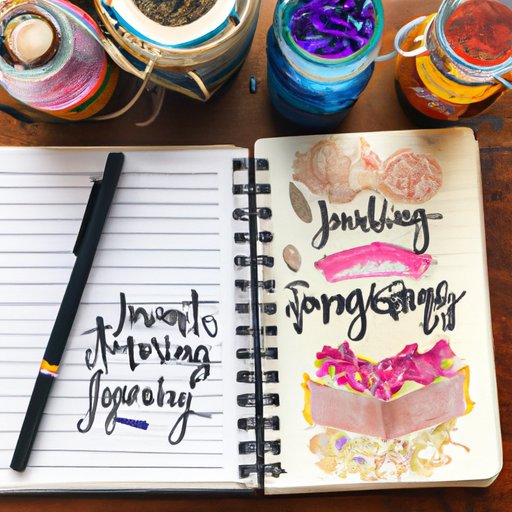Introduction
Journaling can be an incredibly powerful tool for managing and improving mental health. It can help people express their thoughts and feelings in a safe and constructive way. Research has shown that journaling can reduce stress and anxiety, improve mood, and increase self-awareness and self-compassion.
Journaling can also help people cope with difficult emotions. By taking the time to reflect on our thoughts and feelings, we can gain insight into our emotions and learn how to better manage them. This can lead to greater emotional regulation and resilience.

Choosing a Journal and Writing Materials
The first step in starting a journaling practice is to choose a journal and writing materials. There are many different types of journals available, from traditional paper notebooks to digital ones. Choose one that works best for you and your needs. You may also want to consider the size, weight, and design of the journal as well as whether or not it has any special features such as pockets or dividers.
In addition to a journal, you will need writing materials such as pens, pencils, or markers. Choose ones that you feel comfortable with and that you enjoy using. For example, if you prefer writing in color, you may want to invest in a set of colored pens or markers.

Different Types of Journaling Techniques
Once you have chosen a journal and writing materials, you can begin exploring different types of journaling techniques. Here are some of the most popular types of journaling:
Creative Writing
Creative writing is a great way to express yourself and explore your thoughts and feelings. You can use creative writing to write stories, poems, or even just freeform writing. There is no right or wrong way to do it; simply let your thoughts and emotions flow onto the page.
Gratitude Journaling
Gratitude journaling is a practice of focusing on the positive aspects of life. Each day, take a few moments to write down at least three things that you are grateful for. This can help shift your focus away from negative thoughts and help you appreciate the good things in life.
Stream of Consciousness Writing
Stream of consciousness writing is a form of freeform writing where you allow your thoughts and feelings to flow freely onto the page without judgment or censorship. This can be a powerful way to explore your innermost thoughts and feelings and gain insight into your emotions.
Reflection and Goal Setting
Reflection and goal setting can be used to review past experiences and plan for the future. Take the time to reflect on your successes and failures and identify areas where you can make improvements. Then, set goals for yourself and create a plan for achieving them.
Establishing a Regular Journaling Practice
Once you have chosen a journal and writing materials and explored different types of journaling techniques, it’s time to establish a regular journaling practice. Here are some tips for getting started:
Set Aside Time Each Day to Journal
Set aside a few minutes each day to journal. Try to find a time that works best for you and stick to it. If you find that you don’t have enough time in the day, try waking up a few minutes earlier or going to bed a few minutes later. You may also want to consider setting aside a specific space in your home for journaling.
Find an Accountability Partner or Group
Having an accountability partner or group can help keep you motivated and on track. Find someone who can check in with you regularly and provide encouragement and support. You can also join an online journaling group or attend a journaling workshop to connect with other journalers.
Make Journaling a Priority
It’s important to make journaling a priority and treat it as an important part of your daily routine. Remind yourself of why you are journaling and how it can benefit your mental health. When life gets busy, remember to take a few moments each day to write in your journal.

Finding Inspiration and Motivation for Journaling
Sometimes it can be difficult to find the motivation to journal. To help get you started, try reading inspiring quotes or stories, listening to music, or connecting with nature. These activities can help inspire you and give you something to write about.
Conclusion
Journaling can be a powerful tool for improving mental health. It can help us express our thoughts and feelings in a safe and constructive way and can help us cope with difficult emotions. To get started with journaling, choose a journal and writing materials, explore different types of journaling techniques, and establish a regular journaling practice. Finally, find inspiration and motivation by reading inspiring quotes or stories, listening to music, or connecting with nature.
As Dr. Richard Carlson said, “Don’t sweat the small stuff…and it’s all small stuff.” Taking the time to journal can help us put things into perspective and gain a better understanding of our emotions.
(Note: Is this article not meeting your expectations? Do you have knowledge or insights to share? Unlock new opportunities and expand your reach by joining our authors team. Click Registration to join us and share your expertise with our readers.)
